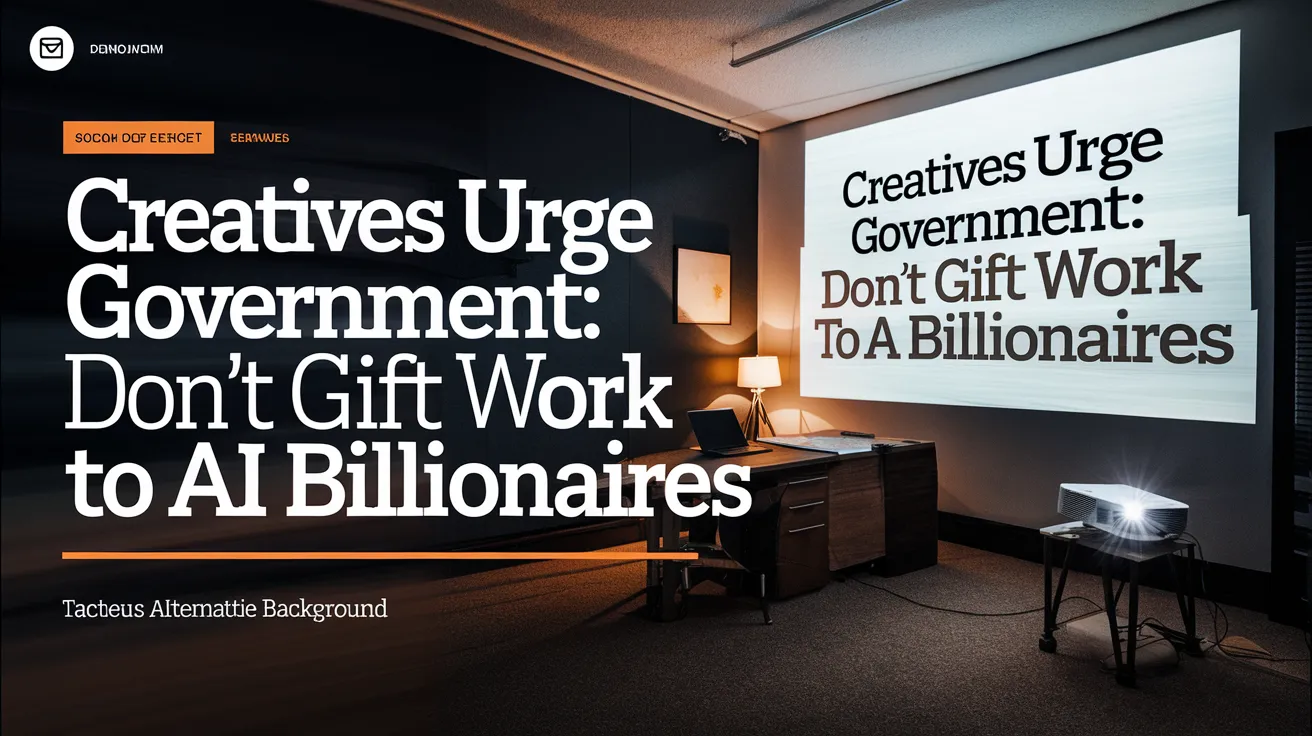Creatives Urge Government: Don’t Gift Work to AI Billionaires

The rise of artificial intelligence (AI) and the UK government’s proposals to loosen copyright rules pose a significant threat to original British art and creative talent, according to prominent cultural figures. Over 2,000 individuals, including respected authors and illustrators like Mark Haddon, Axel Scheffler, Benji Davies, and Michael Rosen, have united to sign a letter published in the Observer, urging the government to maintain legal safeguards that provide artists and writers with sustainable income.
This urgent plea highlights the potential detrimental effects of AI on various creative industries, particularly in light of worries raised by icons such as Sir Elton John and Joan Armatrading regarding its implications for the music sector. John explicitly warned that the impending copyright exemption could “devastate our creative community” while simultaneously enriching powerful foreign technology companies.
The letter specifically critiques a clause in the government’s upcoming AI Opportunity Action Plan, which advocates for the abolition of copyright protections to facilitate increased data mining of artistic works. Though the signatories recognize the government’s intention to stimulate growth, they expressed their astonishment at Whitehall’s rush to “wrap our live’s work in attractive paper as a welcome gift to automated competitors.”
Children’s book author and illustrator Ged Adamson evoked a chilling analogy, questioning the appropriateness of having AI generate a child’s artwork instead of the child themselves. “It’s a horrible thought,” he stated, “and yet we are readily accepting this fate that robs us of income and potentially our ability to innovate.”
Similarly, fellow author Benji Davies expressed concern that the fundamental fabric of an entire creative culture is at risk of being relinquished. He noted with disappointment that the government fails to acknowledge the negative consequences of these proposed changes, which would undermine copyright laws protecting individual creators. “This proposal rides roughshod over that,” he lamented.
The Risks of AI Encroachment on Creativity
Experts campaigning alongside Adamson, including Simona Ciraolo and Momoko Abe, underscored the crucial economic role that fresh creative work plays beyond personal fulfillment. With the sector employing about 2.4 million people and accounting for over 5% of the UK’s gross national product, they stress that the encroachment of big tech threatens to supplant the livelihoods of many creative professionals.
Moreover, the campaign seeks to clarify misconceptions about AI, asserting that it lacks true innovation capabilities, relying instead on remixing existing material without developing novel ideas or discarding outdated biases. Susie Alegre, author of Human Rights, Robot Wrongs, remarked on the essential need to preserve human culture and the role of creators, warning that neglect could lead us to lose our humanity entirely.
Chris Haughton, another prominent signatory, emphasized that their stance isn’t inherently anti-technology. However, he criticized the creative void left by generative AI, which he labels as theft rather than innovation. “We stand to hand over the wealth generated by the creative industries to the tech industry,” he cautioned, highlighting the economic risk involved.
Momoko Abe noted that advancements in representation for diverse and minority groups could regress if AI were allowed to dominate creative sectors, potentially sidelining newly emerged voices in literature and art. “Generative AI creates unfair competition for all creatives, and minority creatives will likely feel the impact first,” she asserted.
Ciraolo echoed these concerns, encouraging proactive engagement to prevent history from repeating itself with the social media missteps of earlier years. She argued that the current governmental proposals offer no advantages for creators, framing the consultation process as manipulative, designed to suppress dissent. “Creatives are not just jealous gatekeepers of privilege but hardworking individuals often struggling for fair compensation,” she emphasized.
The implications of these proposed changes extend beyond economics, affecting the creativity of future generations. Ciraolo expressed her fears about robbing children of the learning experiences that come from cultivating artistic skills. “Generative AI mimics creativity while stripping away the required skill development,” she warned. The message from these cultural figures is clear: actionable measures are needed to ensure the protection of creative work in the face of advancing AI technologies.